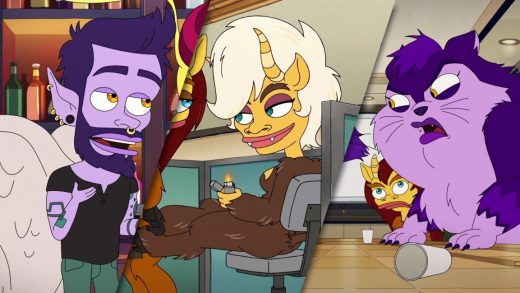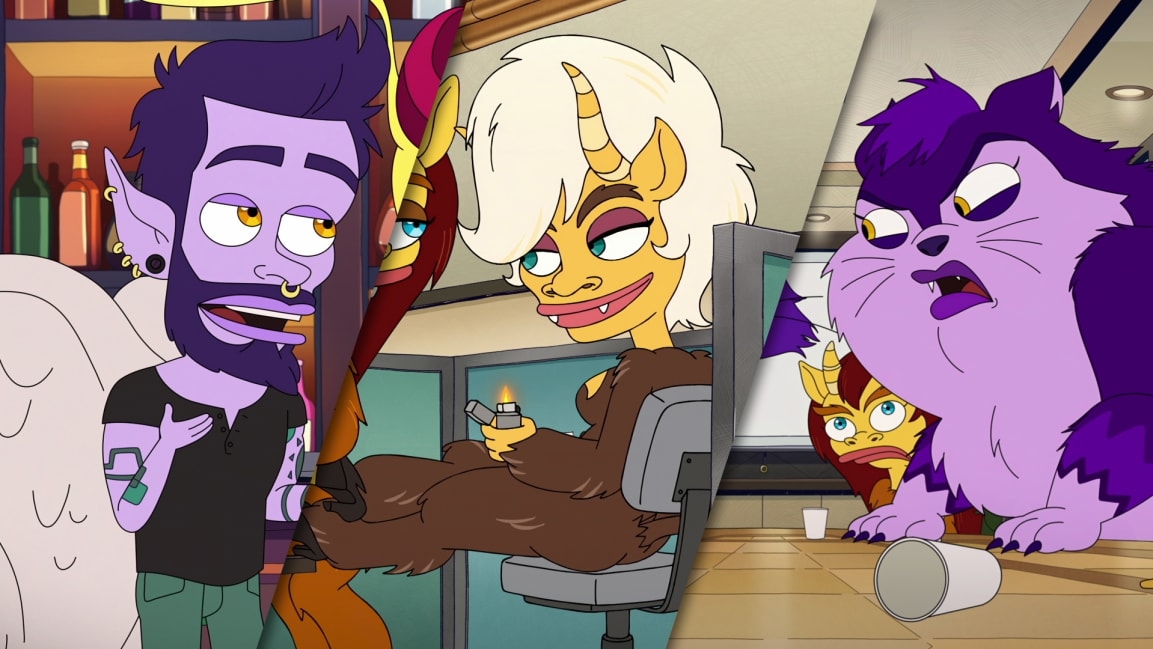Why Netflix’s ‘Human Resources’ is more than a workplace comedy
For much of Nick Kroll’s hit Netflix series Big Mouth, the misadventures of pubescent preteens, and the monsters governing their hormones and emotions, take place in the real world—or as real a world as can exist with such a premise.
But at the end of Season 2 of the Emmy Award-winning animated show, audiences got a glimpse of Human Resources, the office where Hormone Monsters, Ambition Gremlins, and Depression Kitties slog through a 9-to-5 like everyone else. That episode eventually spawned the Big Mouth spinoff Human Resources, which premieres on Netflix on March 18.
“It just felt like such a great opportunity to build a new show that was obviously an extension of what we had already built, but also allowed us to tackle so many more elements of life,” Kroll says.
On one level, Human Resources shifts the focus from kids fumbling through puberty to adults grappling with deeper struggles and heartaches. On another, it’s a workplace comedy satirizing office culture today. A particularly pertinent episode finds the Hormone Monsters forced to sit through a sensitivity-training course because their non-Hormone Monster colleagues were uncomfortable with them having sex all over the office.
“Our goal in that episode is not to be like, ‘Everybody’s too sensitive now! You can’t screw at work anymore and sexually harass!’ But, that’s who they are and that’s what they do,” Kroll says. “It’s learning to be respectful that that’s not what everybody needs and wants in a workplace is part of being a part of a community in any space.”
“Big Mouth is so much about puberty and adolescence. It’s really an exercise in investigating what kids are up to today or looking back at what our experiences were at that point,” Kroll says. “A major impetus for doing Human Resources was for us to be able to explore all of these other major focal points of life, like giving birth and then postpartum depression, or having an aging parent or grandparent going through dementia, or going to college and whether you stay together with your girlfriend or not.”
Guiding adults through their life decisions are new monsters and creatures that represent emotions Big Mouth hasn’t tackled, e.g. the Logic Rock (voiced by Randall Park), as well as more nuanced variations of broader emotions.
“As storylines come up, like dementia or losing a grandparent, it leads us to create Keith from Grief, [a sweater] voiced by Henry Winkler,” Kroll says. “Grief we couldn’t cover with anxiety or depression.”
As a creative exercise, Kroll says he asked his writers room which creatures were front and center for them. When you flip the question on Kroll, he just has all the feels.
“I got married and had a child all basically in the time that we’ve made this show so far, so I think my Lovebug is definitely front and center,” he says. “But then I’m making Human Resources and Big Mouth, and I’m developing a number of other shows. And so I would have to admit that my Ambition Gremlin is also pretty central. With COVID and a brand-new baby, my Anxiety Mosquito is probably more present than it has been in the past,” he adds. “My philosophy in general is you’re at your best when all your creatures have a seat at the table in the conference room. They all have a say because they all are part of us for a reason, including our Shame Wizard and our Anxiety Mosquito. Understanding that certain people have a Depression Kitty that’s with them [because] that’s part of who they are and to deny that is to deny their essence.”
If there were a creature dedicated to stress, it would certainly have a seat at Kroll’s table, as he is currently cowriting and executive-producing History of the World, Part II, the (very) long-awaited sequel to Mel Brooks’s 1981 film that satirizes major historical events throughout time. “I feel two different pressures and responsibilities,” says Kroll. “One, to the legacy of History of the World, Part I, and the work of Mel Brooks in general. The last thing I would ever want to do is not pay proper homage to my literal comedy hero,” he says. “And then the separate pressure of what stories are we telling and who’s telling them, which is something that I think everyone in entertainment is feeling now more than we did, for good reason.”
Kroll is also developing TV shows and films under his production company Good at Business, which he launched in 2020. “I have been more and more interested in helping to tell more people’s stories,” he says. “My goal is to be very selective and really hands on with the work that I do.”
Up first on Good at Business’s slate is an adaptation of Calvin Kasulke’s debut novel Several People Are Typing, a sendup of current workplace culture that finds a man trapped in Slack.
“Slack is such a prevalent language for so many people in the country right now and around the world,” Kroll says. “So, hopefully, it will feel very relatable to people who work in corporate spaces, who understand these multiple spaces that we have to inhabit all at the same time, and the code switching that happens in between those spaces.”
In all of the projects Kroll is involved in, he’s tapping into the intersection of “big laughs” and “big feelings.”
“Even when you look at [Comedy Central’s] Kroll Show, as ridiculous as Kroll Show was, much of it was very emotionally driven stories,” he says. “Big Mouth, we really focused on that. Human Resources, I would say there’s even more of a strong, emotional core to every one of our stories. The shows and movies that I’m building, even when the jokes are huge and ridiculous and insane, the characters and the core of what those stories are are really grounded in emotional truths.”
“Because I have found, from my experience,” Kroll continues, “that the more emotional your stories are, the more insane you can get with your jokes.”
(24)



